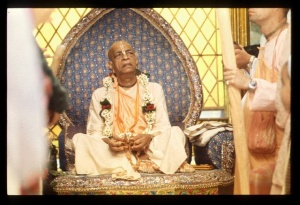SB 10.7.7

A.C. Bhaktivedanta Swami Prabhupada
TEXT 7
- adhaḥ-śayānasya śiśor ano 'lpaka-
- pravāla-mṛdv-aṅghri-hataṁ vyavartata
- vidhvasta-nānā-rasa-kupya-bhājanaṁ
- vyatyasta-cakrākṣa-vibhinna-kūbaram
SYNONYMS
adhaḥ-śayānasya — who was put underneath the handcart; śiśoḥ — of the child; anaḥ — the cart; alpaka — not very much grown; pravāla — just like a new leaf; mṛdu-aṅghri-hatam — struck by His beautiful, delicate legs; vyavartata — turned over and fell down; vidhvasta — scattered; nānā-rasa-kupya-bhājanam — utensils made of various metals; vyatyasta — dislocated; cakra-akṣa — the two wheels and the axle; vibhinna — broken; kūbaram — the pole of the handcart.
TRANSLATION
Lord Śrī Kṛṣṇa was lying down underneath the handcart in one corner of the courtyard, and although His little legs were as soft as leaves, when He struck the cart with His legs, it turned over violently and collapsed. The wheels separated from the axle, the hubs and spokes fell apart, and the pole of the handcart broke. On the cart there were many little utensils made of various metals, and all of them scattered hither and thither.
PURPORT
Śrīla Viśvanātha Cakravartī Ṭhākura has commented on this verse as follows. When Lord Kṛṣṇa was of a very tender age, His hands and legs resembled soft new leaves, yet simply by touching the handcart with His legs, He made the cart fall to pieces. It was quite possible for Him to act in this way and yet not exert Himself very much. The Lord in His Vāmana avatāra had to extend His foot to the greatest height to penetrate the covering of the universe, and when the Lord killed the gigantic demon Hiraṇyakaśipu, He had to assume the special bodily feature of Nṛsiṁhadeva. But in His Kṛṣṇa avatāra, the Lord did not need to exert such energy. Therefore, kṛṣṇas tu bhagavān svayam: (SB 1.3.28) Kṛṣṇa is the Supreme Personality of Godhead Himself. In other incarnations, the Lord had to exert some energy according to the time and circumstances, but in this form He exhibited unlimited potency. Thus the handcart collapsed, its joints broken, and all the metal pots and utensils scattered.
The Vaiṣṇava-toṣaṇī remarks that although the handcart was higher than the child, the child could easily touch the wheel of the cart, and this was sufficient to send the demon down to the earth. The Lord simultaneously pushed the demon to the earth and superficially broke the handcart.